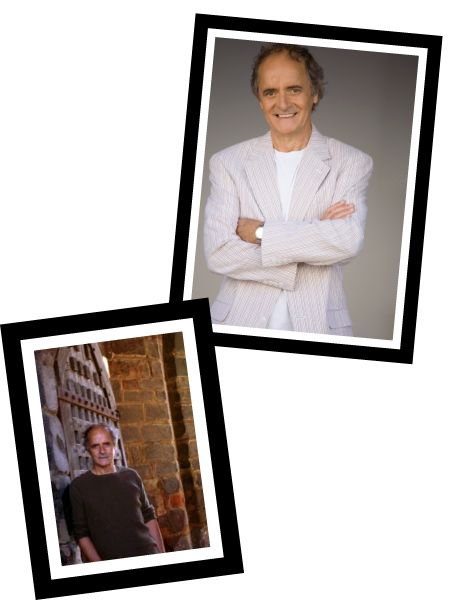
All You Need to Know About Roger Cairns
Roger Cairns started singing at a very early age and hasn’t stopped since. He sang at his aunt’s wedding when he was three years old. He sang in the church choir. Every year, he sang at the local residents’ association Christmas party. He sang at school and was 12 when he was awarded the Robert Burns Prize for excellence in the singing of Scottish songs. That’s what Roger knew, that’s what he loved, and that’s what he decided he was going to do when he turned 9: he was going to become a singer.
Flash-forward 50 years and Roger is in Los Angeles, California, singing with a 20-piece jazz orchestra. His musical path out of the Scottish projects was circuitous, to say the least. It took him from crawling over English rooftops installing television antennas to delivering refreshments to the Beatles; from taking helicopter trips to North Sea oil rigs to organizing outdoor stunt spectaculars in Saudi Arabia; from impromptu visits by the KGB to the birth of his three children. And yet, though life frequently got in the way and Roger had to put his musical career on hold several times over the years, never did any of his experiences feed his soul the way music did, and nothing ever replaced his love for singing.
Roger was born in the small coal-mining village of Gilmerton, a suburb of Edinburgh, in 1946. Not surprisingly, Roger’s talent and his penchant for music were neither nurtured nor welcomed by his family in a post-war Britain more concerned with survival than entertainment. So when he was 15 years old, Roger was sent off to complete a five-year mining engineering apprenticeship with the National Coal Board. But eighteen months later, tired of being underground, Roger emerged from the bowels of the Scottish mines and headed for London to pursue his dream. He was 17.
Within a couple of years, Roger found himself touring Germany with London-based Rare Amber and releasing a blues album on the Polydor label. Then came Rubber Duck, a nine-piece jazz rock ensemble that caught the ear of Bee Gees manager Dick Ashby and earned Roger backstage congratulations from Jimi Hendrix.
The group Listen, led by Essex-based composer Paul Abrahams, followed and won a national rock contest in 1972. With Listen, Roger sang on BBC TV’s flagship Old Grey Whistle Test, performed live on Britain’s chief radio station, Radio One, and landed on the front page of the then best-selling music paper, Melody Maker. Listen also performed at Queen Alexandria Hall in Kensington on the occasion of Prime Minister Tony Blair’s nineteenth birthday. More success followed as Roger secured an EMI recording contract, enjoyed radio airplay across the dial in the UK, and garnered widespread coverage in national and regional dailies.
He fronted Roger Berteau and the Radiomen, released a couple of singles on the Hollywood label under the stage name John Laine, and landed an interview and performance on BBC TV’s nationwide Breakfast Time morning program. He was also a guest on Richard Baker’s celebrated Start the Week Radio 4 program. Who is this man? A blues singer? A jazz singer? John Laine? If there’s one thing people who know Roger will agree on, it is that he is a chameleon. He can move seamlessly between styles and genres, between blues, jazz, ballads, and swing; between musical eras, like the show tunes of the 30s and 40s, through the lush ballads of the 50s and early 60s, to the revived rhythm and blues of the 60s, and the fusions of the 70s.
After all, Roger’s musical influences are motley, ranging from Ray Charles to Mel Torme, David Clayton-Thomas to Johnny Hartman, and Steve Winwood to Vic Damone. And yet, although it’s tempting to suggest that Roger’s inimitable sound is a reflection of the kaleidoscope of music that emerged during his formative years, Roger’s unique singing style simply cannot be pinned down. As composer Paul Abrahams states, Roger has integrated the “disparate strands [of the masters] into something that is distinctly his own.” It’s not surprising if you consider that, as a teenager, Roger was fascinated with the science of singing—the phrasing and vocal technique of one artist and the voice production of another. He was beguiled with the capacity of certain song stylists to convey emotion so purely, with such subtle discipline in their vocal technique that they were more moving to behold than any rock star throwing himself about the stage.
He was a student of music itself, immersing himself in all its breadth and depth. He was soaking it in, literally communing with sound. As a result, when Roger performs, he doesn’t just sing, he feels. And today, it’s jazz that Roger is feeling. In 1992, he auditioned with the LA-based Dirk Fisher Big Band; he signed on and has performed with the band ever since. But that’s not all. Though the sheer exhilaration of fronting a big band performing swing continues to gratify Roger immensely, he could not resist the draw of leading a small group. With the enthusiastic support of his new wife Chitra and the unstinting help of his hugely talented arranger/pianist/composer and fellow jazz lover Gary Fukushima, Roger established his new five-piece Roger Cairns Combo.
The less structured setting of a quintet accommodates improvisation, so Roger now enjoys the freedom to weave in and around material that is as eclectic as Roger’s past. The resulting sound has the sense of deja vu but, yet, feels fresh and original, while at the same time is familiar, comfortable, and welcoming without being tired or jaded.
Jumana Abu-Ghazaleh






